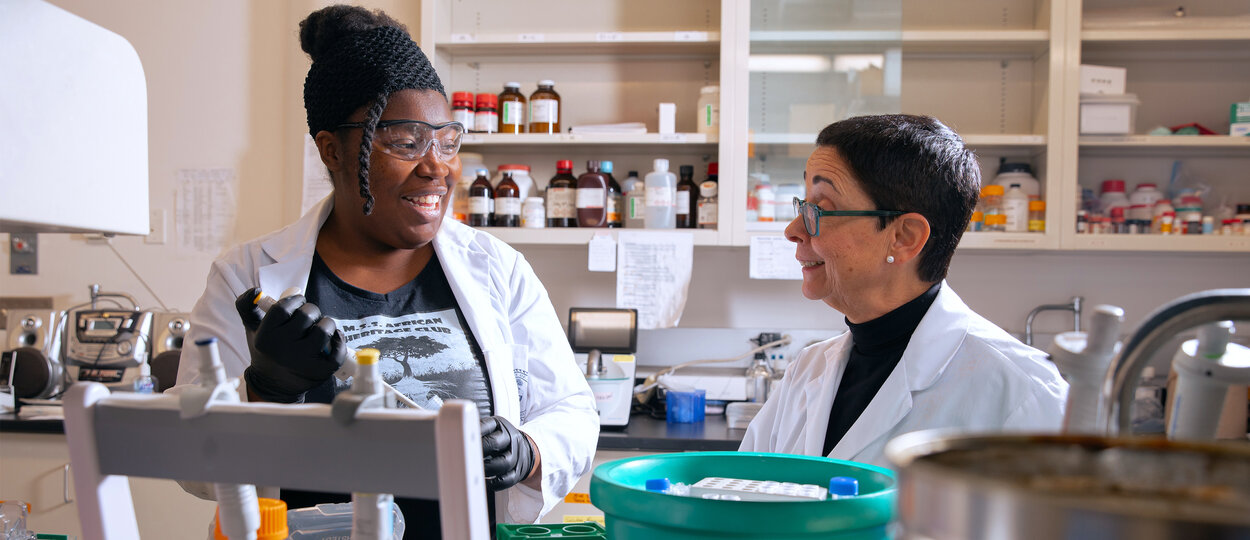Advances in treatment for human immunodeficiency virus (HIV) have not only helped to extend the lives of people living with the virus but can also prevent transmission of HIV from pregnant women to their babies. One such drug, dolutegravir, is low-cost, accessible, and highly effective, making it an important treatment option, especially in African countries.
But these treatments are not without risk.
“The administration of the drugs to the mother prevents the transmission of infection to the newborn, and there’s no question that this treatment is extremely effective in eradicating the infection in newborns, so there is a great benefit,” says Reina Bendayan, professor at U of T’s Leslie Dan Faculty of Pharmacy. “However, a number of problems have been reported in the clinic in some of the children that have been exposed to the anti-HIV drugs.”
A few years ago, a high-profile paper alerted the international community that babies in Botswana that were exposed to the anti-HIV drug dolutegravir in utero had an increased risk of birth defects. But pausing use of the drug could have consequences for transmission of HIV, particularly in low-resource countries where other antiretroviral treatments aren’t as readily available.
Bendayan’s research has long focused on HIV antiretroviral treatments, specifically examining how specialized proteins called transporters move these drugs from blood into tissues. In recent years, her lab has also looked at transport proteins that move the nutrient folate into the placenta and fetus during pregnancy and how interactions with these transport proteins could contribute to folate deficiency, which can result in neurodevelopmental defects in children.
Bendayan says that when her team saw the research about a potential link between dolutegravir and birth defects, they immediately wondered whether these drugs might be interacting with the folate transporters and inhibiting folate uptake in the placenta. Their initial studies on this question identified a potential interaction.
Now, Bendayan, with co-principal investigator Lena Serghides, associate professor in the department of immunology at U of T’s Temerty Faculty of Medicine, has received a $960,000, five-year CIHR grant to build on the team’s earlier work. They will study membrane transport proteins, including folate transporters, that regulate the distribution and delivery of anti-HIV drugs to the fetus – not just dolutegravir but also newer drugs of the same class.
“Our overall goal is to investigate this potential interaction of first-line anti-HIV drugs during pregnancy and to further examine the levels of folate in the fetus.”
“Our overall goal is to investigate this potential interaction of first-line anti-HIV drugs during pregnancy and to further examine the levels of folate in the fetus,” says Bendayan. “We are looking at biodistribution of these drugs, but at the same time we are investigating potential fetal toxicities that may result from these drugs.”
Using human cells, placenta tissue, and research models, they are examining how expression and location of the transport proteins in the placenta change through gestation, the impact this has on how much of the drug crosses into the placenta, and whether this results in any neurodevelopmental defects. They are also examining whether male and female fetuses differ in their membrane transport expression, drug concentrations, and toxicity levels.
“By improving our basic understanding of how these transporters change throughout pregnancy, our findings could have broader implications, providing insights about safety and fetal development of a wide spectrum of medications used in pregnancy,” says Serghides.
Results will help physicians recommend best treatments for pregnant population
Teresa Bennett, a master’s student in the department of pharmaceutical sciences at the Leslie Dan Faculty of Pharmacy and recipient of a Canada Graduate Scholarship – Master’s program, started working in Bendayan’s lab in 2022 after conducting undergraduate research on HIV-related stigma. She is running the various experiments and collecting the data for the project as part of her thesis project, which she says combines her two academic interests – newborn and fetal health, and HIV care.
“Before a drug is approved for use, it has to go through rigorous testing, but oftentimes there isn’t as much research done on the pregnant population and how it will impact them and their baby,” says Bennett. “I’m hoping this research will further inform guidelines so that we can keep the pregnant population in a controlled HIV status throughout their pregnancy, but also keep the baby healthy.”
Bendayan agrees that the study will provide important information on the impact of these critical drugs on fetuses, which will help guide treatment decisions for pregnant people with HIV.
“We really want to clarify whether the newer drugs in this class would potentially be a better choice. These haven’t been in the clinic very long, so we don’t know yet, and we hope our studies can shed some light on that,” says Bendayan. “We hope that this research will provide a greater understanding of the potential toxicity implications of these specific antiretroviral drugs so that we have better guidance on which antiretroviral drugs physicians should recommend to their patients.”
More News
Image

Dean Lisa Dolovich reappointed for second term
Professor Lisa Dolovich has been reappointed for a second term as Dean of the Leslie Dan Faculty of Pharmacy, University of Toronto, effective July 1, 2025, to December 30, 2030.
Read More
Image

Pharmacy Summer Camp gives high school students insight into pharmacy profession
A new summer camp based at the faculty will give high school students a range of experiences in pharmacy and pharmaceutical sciences.
Read More
Image

Team GloveLift wins 2025 Business Plan Competition with innovative medical device
PharmD students win $5,000 prize for their innovative medical device concept aimed at improving patient care.
Read More

